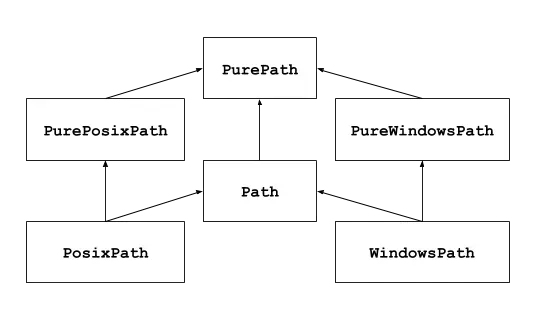-
Python 标准库之pathlib,路径操作
背景
pathlib标准库是在 Python3.4 引入,到现在最近版 3.11 已更新了好几个版本,主要是用于路径操作,相比之前的路径操作方法os.path有一些优势,有兴趣的同学可以学习下**官方文档:**https://docs.python.org/zh-cn/3/library/pathlib.html

小编环境
import sys print('python 版本:',sys.version.split('|')[0]) #python 版本: 3.11.4- 1
- 2
- 3
主要方法、函数
该模块中主要使用的是
Path类- 导入模块
from pathlib import Path- 1
- 获取当前工作目录
Path.cwd() #WindowsPath('D:/桌面/Python/标准库')- 1
- 获取用户 home 目录
Path.home() #WindowsPath('C:/Users/admin')- 1
- 获取绝对路径
file = Path('pathlib_demo1.py') print(file) #WindowsPath('pathlib_demo1.py') file.resolve() #WindowsPath('D:/桌面/Python/标准库/pathlib_demo1.py')- 1
- 2
- 3
- 获取文件属性
file = Path('pathlib_demo1.py') print(file) #WindowsPath('pathlib_demo1.py') file.stat() ''' os.stat_result(st_mode=33206, st_ino=1970324837176895, st_dev=2522074357, st_nlink=1, st_uid=0, st_gid=0, st_size=273, st_atime=1695642854, st_mtime=1695611301, st_ctime=1695611241) ''' #文件大小 file.stat().st_size #273B #最近访问时间 access ,It represents the time of most recent access file.stat().st_atime #1695625134.9083948 #创建时间 create,It represents the time of most recent metadata change on Unix and creation time on Windows. file.stat().st_ctime #1695611241.5981772 #修改时间 modify,It represents the time of most recent content modification file.stat().st_mtime #1695611301.1193473- 1
- 2
- 3
- 4
- 5
- 6
- 7
- 8
- 9
- 10
- 11
- 12
- 13
- 14
- 15
- 16
- 17
- 18
- 19
- 20
- 21
- 查看当前工作目录文件及文件夹
for f in path.iterdir(): print(f) print('is_file:',f.is_file()) #判断是否为文件 print('is_dir:',f.is_dir()) #判断是否为文件夹 print('='*30) ''' D:\桌面\Python\标准库\.ipynb_checkpoints is_file: False is_dir: True ============================== D:\桌面\Python\标准库\pathlib.ipynb is_file: True is_dir: False ============================== D:\桌面\Python\标准库\pathlib_demo1.py is_file: True is_dir: False ============================== '''- 1
- 2
- 3
- 4
- 5
- 6
- 7
- 8
- 9
- 10
- 11
- 12
- 13
- 14
- 15
- 16
- 17
- 18
- 19
- 20
- 路径的各个组成部分
file=Path('D:\桌面\Python\标准库\pathlib_demo1.py') file.name #'pathlib_demo1.py' file.stem #'pathlib_demo1' file.suffix #'.py' file.parent #WindowsPath('D:/桌面/Python/标准库') file.anchor #'D:\\' file.parent.parent #WindowsPath('D:/桌面/Python') #获取所有的父级路径,层层递进 list(file.parents) ''' [WindowsPath('D:/桌面/Python/标准库'), WindowsPath('D:/桌面/Python'), WindowsPath('D:/桌面'), WindowsPath('D:/')] '''- 1
- 2
- 3
- 4
- 5
- 6
- 7
- 8
- 9
- 10
- 11
- 12
- 13
- 14
- 15
- 16
- 17
- 路径拼接
支持2种方式
#第1种方式:使用 / Path.home() / 'dir' / 'file.txt' #WindowsPath('C:/Users/admin/dir/file.txt') #第2种方式:使用方法 Path.home().joinpath('dir', 'file.txt') #WindowsPath('C:/Users/admin/dir/file.txt')- 1
- 2
- 3
- 4
- 5
- 判断路径、文件是否存在
#当前文件件里面是否存在 子目录 archive/demo.txt 文件 Path("archive/demo.txt").exists() #False #当前文件件里面是否存在 二级子目录 dir/subdir Path('dir/subdir').exists() #True #当前文件件里面是否存在 pathlib_demo1.py 文件 Path("pathlib_demo1.py").exists() #True- 1
- 2
- 3
- 4
- 5
- 6
- 7
- 8
以上是自己实践中遇到的一些问题,分享出来供大家参考学习,欢迎关注微信公众号:DataShare ,不定期分享干货
-
相关阅读:
计算机毕业设计ssm社会热点在线系统rghc9系统+程序+源码+lw+远程部署
两台电脑共享文件设置
相机模型Omnidirectional Camera(全方位摄像机)
题目0095-删除指定目录
使用UICollectionView制作轮播图(一)
培训学校的教务管理系统存在的问题有哪些?
代码随想录一刷打卡——.二叉树的层次遍历(十题特别版)
基础算法---前缀和
IDEA Maven Dependencies 问题汇总
微信公众号如何运营和管理?
- 原文地址:https://blog.csdn.net/zhangtingduo/article/details/133344699
